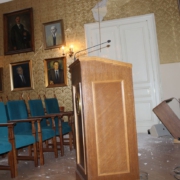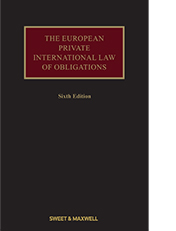Lex Fori Reigns Supreme: Indian High Court (Finally) Confirms Applicability of the Indian Law by ‘Default’ in all International Civil and Commercial Matters
Written by Shubh Jaiswal, student, Jindal Global Law School, Sonipat (India) and Professor Saloni Khanderia, JGLS.
In the landmark case of TransAsia Private Capital vs Gaurav Dhawan, the Delhi High Court clarified that Indian Courts are not automatically required to determine and apply the governing law of a dispute unless the involved parties introduce expert evidence to that effect. This clarification came during the court’s examination of an execution petition stemming from a judgment by the High Court of Justice Business and Property Courts of England and Wales Commercial Court. The Division Bench of the Delhi High Court invoked the precedent set by the United Kingdom Supreme Court in Brownlie v. FS Cairo, shedding light on a contentious issue: the governing law of a dispute when parties do not sufficiently prove the applicability of foreign law.
The Delhi High Court has established that in the absence of evidence proving the applicability of a foreign law identified as the ‘proper law of the contract’, Indian law will be applied as the default jurisdiction. This decision empowers Indian courts to apply Indian law by ‘default’ in adjudicating international civil and commercial disputes, even in instances where an explicit governing law has been selected by the parties, unless there is a clear insistence on applying the law of a specified country. This approach aligns with the adversarial system common to most common law jurisdictions, where courts are not expected to determine the applicable law proactively. Instead, the legal representatives must argue and prove the content of foreign law.
This ruling has significant implications for the handling of foreign-related civil and commercial matters in India, highlighting a critical issue: the lack of private international law expertise among legal practitioners. Without adequate knowledge of the choice of law rules, there’s a risk that international disputes could always lead to the default application of Indian law, exacerbated by the absence of codified private international law norms in India. This situation underscores the need for specialized training in private international law to navigate the complexities of international litigation effectively.
Facts in brief
As such, the dispute in Transasia concerned an execution petition filed under Section 44A of the Indian Civil Procedure Code, 1908, for the enforcement of a foreign judgment passed by the High Court of Justice Business and Property Courts of England and Wales Commercial Court. The execution petitioner had brought a suit against the judgment debtor before the aforementioned court for default under two personal guarantees with respect to two revolving facility loan agreements. While these guarantee deeds contained choice of law clauses and required the disputes to be governed by the ‘Laws of the Dubai International Finance Centre’ and ‘Singapore Law’ respectively, the English Court had applied English law to the dispute and decided the dispute in favour of the execution petitioner. Accordingly, the judgment debtor opposed the execution of the petition before the Delhi HC for the application of incorrect law by the Court in England.
It is in this regard that the Delhi HC invoked the ‘default rule’ and negated the contention of the judgment debtor. The Bench relied on the decision rendered by the Supreme Court of the United Kingdom in Brownlie v. FS Cairo, which postulated that “if a party does not rely on a particular rule of law even though it would be entitled to do so, it is not generally for the court to apply the rule of its own motion.”
The HC confirmed that foreign law is conceived as a question of fact in India. Thus, it was for each party to choose whether to plead a case that a foreign system of law was applicable to the claim, but neither party was obliged to do so, and if neither party did, the court would apply its own law to the issues in dispute. To that effect, the HC also relied on Aluminium Industrie Vaassen BV, wherein the English Court had applied English law to a sales contract even when a provision expressly stipulated the application of Dutch law—only because neither party pleaded Dutch law.
Thus, in essence, the HC observed that courts would only be mandated to apply the chosen law if either party had pleaded its application and the case was ‘well-founded’. In the present dispute, the judgment debtor had failed to either plead or establish that English law would not be applicable before the Court in England and had merely challenged jurisdiction, and thus, the Delhi HC held that the judgment could not be challenged at the execution stage.
Choosing the Proper Law
The mechanism employed to ascertain the applicable law under Indian private international law depends on whether the parties have opted to resolve their dispute before a court or an arbitral tribunal. In arbitration matters, the identification of the applicable law similarly depends on the express and implied choice of the parties. Similarly, in matters of litigation, courts rely on the common law doctrine of the ‘proper law of the contract’ to discern the applicable law while adjudicating such disputes on such obligations. Accordingly, the proper law depends on the express and implied choice of the parties. When it comes to the determination of the applicable law through the express choice of the parties, Indian law, despite being uncodified, is coherent and conforms to the practices of several major legal systems, such as the UK, the EU’s 27 Member States, and its BRICS partners, Russia and China – insofar as it similarly empowers the parties to choose the law of any country with which they desire their disputes to be settled. Thus, it is always advised that parties keen on being governed by the law of a particular country must ensure to include a clause to this effect in their agreement if they intend to adjudicate any disputes that might arise by litigation because it is unlikely for the court to regard any other factor, such as previous contractual relationships between them, to identify their implied choice.
Questioning the Assumed: Manoeuvring through the Intricate Terrain of Private International Law and Party Autonomy in the Indian Judicial System
By reiterating the ‘default rule’ in India and presenting Indian courts with another opportunity to apply Indian law, this judgment has demonstrated the general tendency on the part of the courts across India to invariably invoke Indian law – albeit in an implicit manner – without any (actual) examination as to the country with which the contract has its closest and most real connection. Further, the lack of expertise by the members of the Bar in private international law-related matters and choice of law rules implies that most, if not all, foreign-related civil and commercial matters would be governed by Indian law in its capacity as the lex fori. Therefore, legal representatives should actively advocate for disputes to be resolved according to the law specified in their dispute resolution clause rather than assuming that the court will automatically apply the law of the designated country in adjudicating the dispute.
Foreign parties may not want Indian law to apply to their commercial contracts, especially when they have an express provision against the same. Apart from being unclear and uncertain, the present state of India’s practice and policy debilitates justice and fails to meet the commercial expectations of the parties by compelling litigants to be governed by Indian law regardless of the circumstance and the nature of the dispute—merely because they failed to plead the application of their chosen law.
This would inevitably lead to foreign parties opting out of the jurisdiction of the Indian courts by concluding choice of court agreements in favour of other forums so as to avoid the application of the Republic’s ambiguous approach towards the law that would govern their commercial contracts. Consequently, Indian courts may rarely find themselves chosen as the preferred forum through a choice of court agreement for the adjudication of such disputes when they have no connection to the transaction. In circumstances where parties are unable to opt out of the jurisdiction of Indian courts – perhaps because of the lack of agreement to this effect, the inconsistencies would hamper international trade and commerce in India, with parties from other jurisdictions wanting to avoid concluding contracts with Indian businessmen and traders so as to avert plausible disputes being adjudicated before Indian courts (and consequently being governed by Indian law).
Therefore, Indian courts should certainly reconsider the application of the ‘default rule’, and limit the application of the lex fori in order to respect party autonomy.

 Croatian Academy of Science and Art
Croatian Academy of Science and Art
